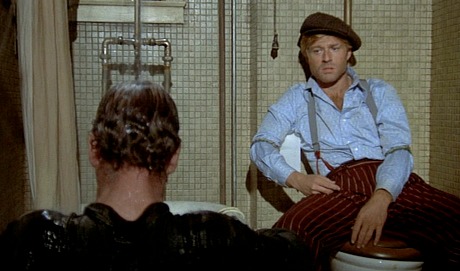If you really value movie craft in all its guises, you can celebrate George Roy Hill‘s The Sting as much as Martin Scorsese‘s Silence, Samuel Fuller‘s Forty Guns, Robert Bresson‘s Au Hasard Balthazar, Barry Jenkins‘ Moonlight or Asghar Farhadi‘s The Salesman. A great film is a great film.
The snobs will never admit this in certain cases, of course. That’s the cave they live in. They hate movies that feel good. Today’s assignment: Name some really good films that the snooties have always spat upon, or at least that were critically loathed when they first opened only to be given their critical due years later. But no comic-book CG superhero films.

A little over four years ago I ran a piece about The Sting. It was basically an answer to a question that Pauline Kael posed 43 years ago: “What is this movie about anyway?” Answer: Emotional comfort in the form of assured professional craft. It’s about conning people into caring about a shallow story with no themes or subcurrents whatsoever. It’s about keeping them intrigued even though the good-guy con artists have the upper hand all the way.
I once called the Chicago Limited poker-game scene “the most satisfyingly shot and performed scene of its type in Hollywood history because it’s not about poker, but about two cheats trying to out-fuck each other. Paul Newman‘s smug and rascally confidence is key, but the whole thing really depends upon Robert Shaw‘s seething rage — the scene wouldn’t play without it. It’s all about boiling blood.
“I can watch this scene all day long and never get bored because it’s perfectly shot, acted, lighted and timed. It’s the kind of thing that big-studio movies used to do really well. The emphasis was just so.”
In 2008 director Rob Cohen (The Fast and The Furious) told the following story to reporter Germain Lussier of the Times Herald, a Hudson Valley newspaper:
“I was a reader for 100 bucks a week for a big agent named Mike Medavoy, who went on to be a studio head and producer,” Cohen began. “Mike put me in this cubbyhole and they hadn’t had a reader in about a month and the backup was enormous in this agency because I was reading scripts for all the agents. So I was in this little cubbyhole piled floor to ceiling with unread scripts and I began to develop a little code unto myself. Like ‘I will never read two scripts in a row with yellow covers.’ Or ‘On Wednesday, I only read scripts with blue covers.’
“So there are all these piles, and Wednesday came and I pulled this script out of the bottom of heap. I had to read five scripts a day and write the coverage on them, basically reading 600 pages of material and writing 10 pages of material a day, which is a lot. So I started to read this script like you begin to read all scripts, like, dubious, because after you’ve been disappointed so many times reading, ‘When am I going to read a really good script?’
“And so I kept turning the pages on this one and it got better, then it got better and it got better and I realized that finally at the end I had been conned and the audience had been conned just like any other long con or short con in the movie. I flipped out and I wrote this glowing two-page synopsis and opinion, that I still have framed in my office, in which I fully went on record as this is the great American screenplay and this will make an award-winning, major-cast, major-director film.
“And the agent, Medavoy, came into my cubbyhole after he read the coverage and said, ‘How good is this script?’ and I said, ‘It’s as good as I just told you.’ And he said, ‘I’m going to try to sell it this afternoon and if I don’t you are fired, so tell me how good the script is.’ I said, ‘You can fire me if you don’t sell it.’
“And he went out, called a few people at Universal and the script was bought that day. And by the end of the week, it had Newman and Robert Redford and George Roy Hill reprising their relationships from Butch Cassidy.'”












